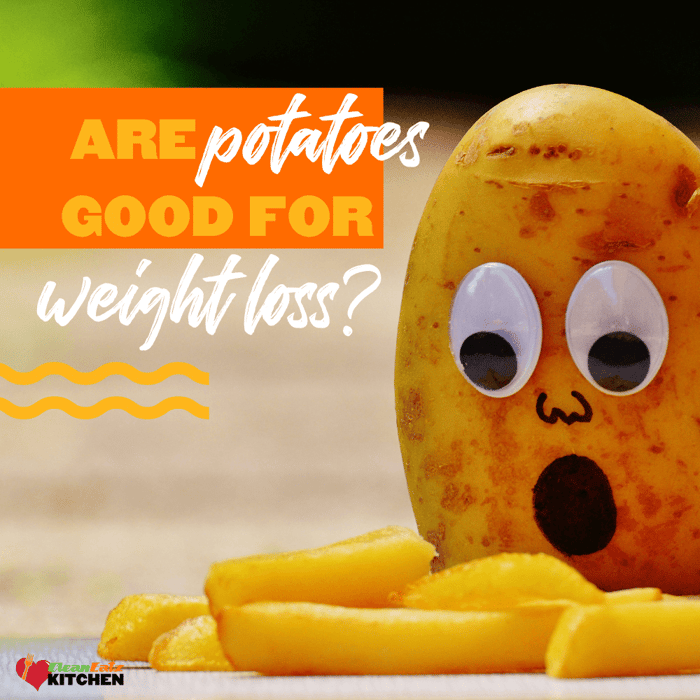Are Potatoes Good for Weight Loss? Yes—Here’s How

Dorothy M. Shirnyl, RND
Nutrition
|
Healthy Recipes
|
Weight Loss
12/12/2025 11:58am
15 minute read
Quick Answer: Yes, potatoes can absolutely support weight loss when prepared simply and portioned appropriately. According to landmark research from the University of Sydney, boiled potatoes rank #1 on the satiety index—they're more filling per calorie than any other common food tested (323% vs. white bread at 100%). A medium potato has just 110 calories, zero fat, and more potassium than a banana. Clinical trials confirm that people eating potato-based meals in calorie-controlled diets lose weight just as effectively as those avoiding potatoes. The key is preparation: boiled, baked, or air-fried potatoes are weight-loss friendly; fries and chips loaded with oil are not.
Table of Contents
- The Most Misunderstood Weight-Loss Food
- Why Potatoes Actually Work for Weight Loss
- Potato Varieties Compared: Nutrition Breakdown
- The Resistant Starch Advantage: Cook, Cool, Conquer
- How to Buy Potatoes for Weight Loss
- Best Cooking Methods for Weight Loss
- Recipe: Weight-Loss Friendly Crispy Smashed Potatoes
- 5 Complete Meal Ideas with Potatoes
- 6 Low-Calorie Flavor Variations
- 7 Potato Mistakes That Sabotage Weight Loss
- Frequently Asked Questions
- The Bottom Line
The Most Misunderstood Weight-Loss Food
I recently had a conversation with someone who'd been avoiding potatoes for years because she thought they were "too carby" for weight loss. She was eating rice, pasta, and bread freely but wouldn't touch a potato. When I showed her the research, her exact words were: "You're telling me the food I've been avoiding is actually the MOST filling thing I could eat?"
Yep. That's exactly what I'm telling you.
Potatoes have somehow become the villain of the weight-loss world, lumped in with junk food because fries and chips are technically potato products. But here's the thing: a plain baked potato and a large order of fries are about as similar as grilled chicken and fried chicken tenders. Same starting ingredient, completely different nutritional profile.
The science is clear, and it's probably going to surprise you. Potatoes aren't just "okay" for weight loss—when prepared properly, they might be one of your most powerful tools for staying full on fewer calories. This guide will teach you everything you need to know about using potatoes strategically for fat loss, including the cooking method that actually makes them healthier, the varieties that work best, and exactly how to build satisfying meals around them.
Why Potatoes Actually Work for Weight Loss
Let's get one thing straight: potatoes are not empty carbs, and the science backing their role in weight management is surprisingly robust. Here's why they can actually help you lose fat.
The Satiety Index Champion
In 1995, researchers at the University of Sydney conducted what's become a landmark study in nutrition science. They fed 240-calorie portions of 38 different foods to volunteers, then tracked how full people felt and how much they ate afterward at a buffet. The results published in the European Journal of Clinical Nutrition were striking: boiled potatoes scored 323% on the satiety index, using white bread as the baseline of 100%.
To put that in perspective, potatoes were seven times more filling than croissants and more than three times more satisfying than white bread. They beat steak. They beat eggs. They beat oatmeal. Nothing else came close.
Why does this matter for weight loss? Because if you're eating foods that keep you full longer on fewer calories, you naturally eat less overall. That's the fundamental equation for fat loss, and potatoes are built for it.
Low Energy Density, High Volume
Energy density refers to how many calories a food packs per gram. Foods with low energy density let you eat more volume for fewer calories—which is exactly what you want when you're trying to lose weight without feeling deprived.
A plain boiled potato has an energy density of about 0.9 calories per gram. Compare that to bread (2.5 cal/g), cheese (4.0 cal/g), or nuts (6.0 cal/g). This means you can eat a large, satisfying portion of potatoes for the same calories as a small handful of nuts. For a comprehensive look at other high-satiety, low-calorie foods, check out our complete guide to the 100 best foods for weight loss.
Potatoes are about 80% water, which contributes to their low energy density and stomach-filling volume. Research on volumetrics consistently shows that people tend to eat a consistent weight of food regardless of calorie content—so water-rich, high-volume foods naturally lead to lower calorie intake.
Clinical Trials Back It Up
The real-world evidence is equally compelling. A 2022 randomized controlled trial from Pennington Biomedical Research Center tested potato-based diets against bean-based diets in people with insulin resistance. Both groups lost significant weight—the potato group lost 5.6% of body weight, the bean group lost 4.1%—without being told to restrict calories. The key? Both diets were built around low-energy-density foods that filled people up before they could overeat.
Another study from UC Davis and Illinois Institute of Technology found that people following calorie-restricted diets lost weight regardless of whether they included potatoes or avoided them. The researchers concluded that it's not about eliminating specific foods—it's about total calories. Potatoes can fit just fine.
Potato Varieties Compared: Nutrition Breakdown
Not all potatoes are identical, though the differences are smaller than you might think. Here's how the main varieties stack up per 150g (about one medium potato), cooked without added fat:
| Variety | Calories | Carbs | Fiber | Protein | Potassium | Best For |
|---|---|---|---|---|---|---|
| Russet | 130 | 30g | 2.3g | 3.5g | 620mg | Baking, mashing |
| Yukon Gold | 120 | 27g | 2.0g | 3.2g | 590mg | Roasting, salads |
| Red Potato | 115 | 26g | 2.1g | 3.0g | 570mg | Potato salad, boiling |
| Fingerling | 110 | 25g | 1.8g | 2.8g | 540mg | Roasting whole |
| Purple Potato | 118 | 27g | 3.0g | 3.0g | 560mg | Antioxidants, visual appeal |
| Sweet Potato | 135 | 31g | 4.0g | 2.5g | 440mg | Beta-carotene, fiber |
Pro tip: Waxy potatoes (reds, Yukon Gold) hold their shape after cooling, making them ideal for potato salads that maximize resistant starch. Starchy potatoes (russets) break down more when cooked, which is great for mashing but less ideal if you want distinct chunks.
The Resistant Starch Advantage: Cook, Cool, Conquer
Here's a trick most people don't know: you can actually change the nutritional properties of potatoes just by cooling them after cooking. It sounds almost too good to be true, but the science is solid.
When you cook a potato, the starch gelatinizes—it becomes soft and easily digestible. But when you cool that cooked potato for 12-24 hours, some of that starch transforms into "resistant starch," which behaves more like fiber. It resists digestion in the small intestine and passes to the large intestine, where it feeds beneficial gut bacteria.
Research published in the journal Nutrients found that chilled potatoes produced significantly lower glucose and insulin responses compared to freshly boiled potatoes—glucose was reduced by 9% and insulin by 23% at the 30-minute mark. The resistant starch content increases from about 3% in freshly cooked potatoes to 5-6% after cooling.
What does this mean practically?
- Make potato salad: Boil potatoes, cool overnight, and serve cold or at room temperature
- Batch prep: Cook a week's worth of potatoes, refrigerate, then reheat as needed (reheating maintains most of the resistant starch benefits)
- Plan leftovers: Intentionally make extra roasted potatoes at dinner to use in tomorrow's lunch
This fits perfectly with meal prep strategies. For more on making healthy eating easier, see our complete guide to meal prepping for weight loss.
How to Buy Potatoes for Weight Loss
Buying potatoes is straightforward, but a few tips will help you get the best quality and value:
What to look for:
- Firm, smooth skin with no soft spots, wrinkles, or sprouting
- No green patches (these contain solanine and taste bitter)
- Uniform size for even cooking
- Clean with no visible dirt or damage
What to avoid:
- Potatoes with sprouts (they're losing nutrients and developing off-flavors)
- Green-tinged skin (cut away any green portions before cooking)
- Soft spots or wrinkled skin (signs of age)
- Cuts or bruises (will spoil faster)
Storage tips:
- Store in a cool, dark, well-ventilated place (not the refrigerator—cold converts starch to sugar)
- Keep away from onions (they release gases that accelerate spoilage)
- Paper bags or mesh bags work better than plastic
- Properly stored potatoes last 2-3 weeks
Budget-friendly tip: Buy 5-10 lb bags for significant savings per pound. Potatoes are one of the most affordable vegetables—typically $0.50-1.00 per pound, making them a budget-friendly protein source when paired with cheaper proteins like eggs or chicken thighs.
Best Cooking Methods for Weight Loss
How you cook potatoes matters more for weight loss than which variety you choose. Here are your best options, ranked:
The Golden Rules of Weight-Loss Potato Cooking
- Measure your fat: A tablespoon of olive oil is 120 calories. Don't eyeball it.
- Keep the skin: It adds fiber and nutrients, plus saves prep time.
- Pair with protein: Always serve potatoes alongside 20-35g protein to slow digestion and increase satiety.
- Add volume: Build your plate with non-starchy vegetables alongside the potato.
Cooking Method Comparison
| Method | Added Calories | Satiety | Notes |
|---|---|---|---|
| Boiled | 0 | ★★★★★ | Highest satiety, ideal for cooling/resistant starch |
| Baked | 0 | ★★★★★ | Great texture, watch your toppings |
| Microwaved | 0 | ★★★★ | Fast and convenient, slightly less fluffy |
| Air-Fried | 30-60 | ★★★★ | Crispy texture with minimal oil |
| Roasted (light oil) | 40-80 | ★★★★ | Measure oil carefully—1 tsp per serving |
| Deep-Fried | 200-400+ | ★★ | Avoid for weight loss—easy to overeat |
Recipe: Weight-Loss Friendly Crispy Smashed Potatoes
This recipe gives you the crispy, satisfying texture of roasted potatoes while keeping calories reasonable. The key is smashing—it creates more surface area for crispiness without needing excessive oil.
Ingredients (serves 4):
- 1.5 lbs baby potatoes (about 20 small), any variety
- 1 tablespoon olive oil
- 1/2 teaspoon garlic powder
- 1/2 teaspoon smoked paprika
- 1/4 teaspoon black pepper
- 1/4 teaspoon salt
- Fresh herbs (rosemary, thyme, or chives) for topping
Instructions:
- Boil potatoes in salted water for 15-20 minutes until fork-tender.
- Drain and let cool slightly (about 5 minutes—just enough to handle).
- Preheat oven to 425°F (220°C). Line a baking sheet with parchment paper.
- Arrange potatoes on the sheet, leaving space between each.
- Use the bottom of a glass or fork to gently smash each potato to about 1/2 inch thick.
- Brush with olive oil and season with garlic powder, paprika, salt, and pepper.
- Bake 20-25 minutes until edges are golden and crispy.
- Top with fresh herbs and serve immediately.
Nutrition per serving: 165 calories, 28g carbs, 4g fat, 3g protein, 3g fiber
Meal prep tip: Make a double batch—these reheat beautifully in the air fryer or toaster oven. Store in the fridge for up to 5 days.
5 Complete Meal Ideas with Potatoes
Potatoes work best as part of a balanced plate. Here are five complete meals that pair potatoes with lean protein and plenty of vegetables. For more meal inspiration, see our top 10 healthy lunch ideas.
1. Protein Power Bowl (480 calories, 38g protein)
- 150g roasted baby potatoes (1 tsp oil)
- 5 oz grilled chicken breast
- 2 cups mixed greens with lemon-olive oil vinaigrette
- 1/4 avocado
2. Salmon & Potato Sheet Pan Dinner (520 calories, 35g protein)
- 150g roasted red potatoes
- 5 oz baked salmon
- 2 cups roasted asparagus and cherry tomatoes
- Lemon-dill Greek yogurt sauce (2 tbsp)
3. Chilled Potato Salad Plate (440 calories, 32g protein)
- 150g cold potato salad (mustard-yogurt dressing)
- 4 oz deli turkey breast, sliced
- 2 hard-boiled eggs
- Cucumber, tomato, and fresh dill
4. Loaded Baked Potato (done right) (470 calories, 34g protein)
- 1 medium baked russet potato (200g)
- 4 oz shredded rotisserie chicken
- 2 tbsp plain Greek yogurt (instead of sour cream)
- 2 tbsp salsa, chives, and a sprinkle of reduced-fat cheese
- Side of steamed broccoli
5. Air-Fryer Potato Wedge Dinner (490 calories, 30g protein)
- 180g air-fried potato wedges (1 tsp oil)
- 5 oz grilled turkey burger (no bun)
- Large mixed salad with vinaigrette
- Mustard and pickles
Want done-for-you portions that still include smart carbs? Our Weight Loss Meal Plan delivers calorie-controlled meals, or customize your own with Build Your Meal Plan.
6 Low-Calorie Flavor Variations
Boring potatoes lead to reaching for butter and cheese. Keep things interesting with these flavor boosters that add minimal calories:
1. Mediterranean (adds ~20 cal): Lemon zest, dried oregano, garlic, touch of olive oil, fresh parsley
2. Smoky Southwest (adds ~10 cal): Smoked paprika, cumin, chili powder, lime juice, fresh cilantro
3. Ranch Style (adds ~25 cal): Dried dill, onion powder, garlic powder, 1 tbsp plain Greek yogurt
4. Asian-Inspired (adds ~15 cal): Low-sodium soy sauce, rice vinegar, sesame seeds, green onion
5. Everything Bagel (adds ~10 cal): Everything bagel seasoning blend (sesame seeds, poppy seeds, dried garlic, dried onion, salt)
6. Indian Spiced (adds ~10 cal): Garam masala, turmeric, cumin, touch of yogurt, fresh cilantro
7 Potato Mistakes That Sabotage Weight Loss
Potatoes can absolutely support weight loss—unless you're making these common errors. Understanding how carbs fit into weight loss helps you avoid these pitfalls.
Mistake #1: Drowning them in fat
A plain baked potato is 130 calories. Add 2 tablespoons of butter and 2 tablespoons of sour cream, and you're suddenly at 330+ calories. The potato isn't the problem—the toppings are. Use Greek yogurt, salsa, or mustard-based sauces instead.
Mistake #2: Eating potatoes without protein
Potatoes alone won't keep you full for hours. The satiety magic happens when you pair them with 20-35g of protein. A potato as a snack by itself? You'll be hungry again in 90 minutes. A potato with grilled chicken? That meal will carry you for 4+ hours.
Mistake #3: Confusing all potato products as equal
Baked potato ≠ French fries ≠ Potato chips. The preparation method changes everything. A medium baked potato is 130 calories; a medium order of fries can be 400+ calories. Choose wisely.
Mistake #4: Going overboard on portions
Even healthy foods can lead to weight gain if you eat too much. Stick to 100-200g cooked potato per meal—about the size of your fist or one medium potato. That's enough for satiety without excess calories.
Mistake #5: Skipping the skin
The skin contains fiber and nutrients that increase satiety and nutritional value. Unless you're making mashed potatoes, keep the skin on.
Mistake #6: Not counting the cooking oil
"I just used a little oil" is how 300 calories sneak into your "healthy" roasted potatoes. Measure your oil every time—1 teaspoon per serving is plenty for roasting.
Mistake #7: Thinking potatoes are "bad carbs"
This myth persists despite the science. Potatoes are a whole food with fiber, potassium, vitamin C, and exceptional satiety. They're nothing like refined carbs. The quality of a carb matters more than avoiding carbs entirely.
Frequently Asked Questions
Are potatoes good for weight loss?
Yes, when prepared simply (boiled, baked, air-fried) and portioned appropriately, potatoes can support weight loss. Research shows boiled potatoes rank #1 on the satiety index—they're more filling per calorie than any other common food tested, making it easier to eat less overall.
How many calories are in a potato?
A medium potato (5.3 oz/150g) with skin contains about 110-130 calories, 26g carbohydrates, 3g protein, and 2g fiber. Potatoes are naturally fat-free and provide 30% of your daily vitamin C and more potassium than a banana.
Why do potatoes have a bad reputation for weight loss?
The bad reputation comes from how potatoes are typically prepared—fries, chips, loaded baked potatoes with butter and sour cream. These preparations add hundreds of calories. Plain potatoes themselves are low-calorie and highly satiating.
Are sweet potatoes better than white potatoes for weight loss?
Both are nutritionally valuable and can fit into a weight loss plan. White potatoes actually score higher on the satiety index (more filling), while sweet potatoes offer more beta-carotene. The best choice is whichever one you'll actually eat prepared healthfully.
Does cooling potatoes increase resistant starch?
Yes, cooling cooked potatoes for 12-24 hours increases resistant starch content from about 3% to 5-6%. Research shows this can reduce blood glucose and insulin responses. Reheating maintains most of these benefits.
How much potato can I eat while losing weight?
Most people do well with 100-200g cooked potato (about one medium potato) per meal as part of a balanced plate. Adjust portions based on your total daily calorie target.
Which potato variety is best for weight loss?
All varieties work. Waxy potatoes (Yukon Gold, red) are great for salads and benefit from cooling. Russets are ideal for baking. The variety matters less than the cooking method—skip the deep fryer and heavy toppings.
Can I eat potatoes every day and still lose weight?
Yes, clinical trials confirm people can include potatoes daily in calorie-controlled diets and lose weight effectively. Total calories and protein intake matter more than whether you include potatoes.
The Bottom Line
Potatoes aren't the enemy of weight loss—they might actually be one of your best tools. The science is clear: boiled potatoes are the single most filling food ever tested, they're low in calories when prepared simply, and clinical trials show they fit perfectly into effective weight loss plans.
The key is preparation. Boiled, baked, or air-fried potatoes with measured oil are weight-loss friendly. Deep-fried potatoes drowning in toppings are not. It's really that simple.
Start with these strategies:
- Keep portions to 100-200g (one medium potato) per meal
- Always pair with 20-35g protein and plenty of vegetables
- Try the cook-and-cool method for resistant starch benefits
- Measure your cooking oil and choose lighter toppings
- Focus on boiled, baked, or air-fried preparations
Stop avoiding the food that could actually help you feel full and satisfied on fewer calories. Your weight loss journey shouldn't mean giving up satisfying, comforting foods—it means learning to prepare them in ways that work for your goals.
Ready to take the guesswork out of weight loss entirely? Our Weight Loss Meal Plan delivers perfectly portioned, macro-balanced meals that keep you satisfied without the calorie counting. Add a potato side when you want extra volume—the meal plan provides the protein-forward foundation.
Related Articles
How to Lose Love Handles: Nutrition, Training & Plan
11 minute read
How to Break a Weight Loss Plateau: Science-Backed Fix
11 minute read



